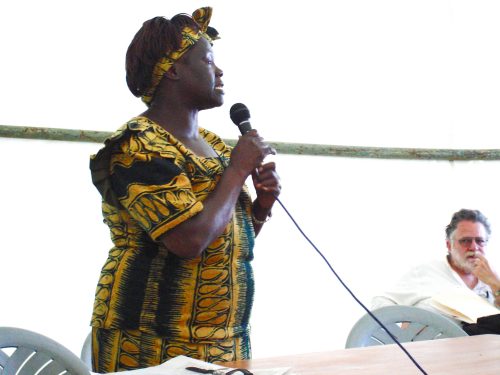
Wangari Maathai (born Wangari Muta) was a kickass woman from Kenya who founded the Green Belt Movement. Her work brought together women’s rights, economic opportunity, and environmental stewardship and became a global movement. She won the Nobel Peace Prize in 2004.
Maathai was born in 1940, in Kenya, which at that time was still a colony of Britain. She was educated in Kenya and in the United States. She was the first woman from East and Central Africa to earn a doctorate, and the first woman in Kenya to become a professor. During this time she was active in community volunteerism and politics.

Maathai married Mwangi Mathai in 1969. They married and had three children. Ultimately, Wangari and Mwangi went through a bitter divorce. During the proceedings, Mathai asked Wangari to stop using her married name. The only concession she made was to add an “a” to her last name. One of her husband’s complaints was that he was “unable to control her.” Later, she said, of this period of her life:
I kept stumbling and falling and stumbling and falling as I searched for the good. ‘Why?’ I asked myself. Now I believe that I was on the right path all along, particularly with the Green Belt Movement, but then others told me that I shouldn’t have a career, that I shouldn’t raise my voice, that women are supposed to have a master. That I needed to be someone else. Finally I was able to see that if I had a contribution I wanted to make, I must do it, despite what others said. That I was OK the way I was. That it was all right to be strong.
Maathai founded the Green Belt Movement in 1977. This movement reaches out to rural women in Kenya and helps them plant seedlings in de-forested areas. In addition to renewing the forests, the project provides villagers with a variety of income-earning opportunities, including forestry projects and bee keeping.
The Green Belt Movement was revolutionary in its holistic approach, its early and constant emphasis on intersectionality, and its approach to feminism as a “day-to-day” work. Over the years Maathai was beaten and jailed twice, as the Green Belt Movement became directly and indirectly involved with Kenyan politics. The Green Belt Movement became highly visible after Maathai won the Nobel Peace Prize and is currently active across Kenya and other African countries.
Maathai died in 2004 2011, in Nairobi, of ovarian cancer. She left a legacy of thousands of new trees. In her honor, Forest Road in Nairobi was renamed “Wangari Maathai Road.”
Here you can see Maathai explain her work:
And here is her Nobel Prize acceptance speech:
Sources:


This was a great piece, which led me to go googling Maathai. But I’m reading she died in 2011, not 2004? http://www.greenbeltmovement.org/wangari-maathai
Eep! My apologies and thank you for the correction.
Thank you, @Meg, you are correct. She won the Novel Peace Prize in 2004 – and was very much alive to receive it. Thank you!
How I wish we had an edit option. Nobel, not Novel. Sheesh.
This is so great! I really appreciate this segment!
Thank you so much for bringing this incredible woman’s achievements to our attention. You are doing a great service to bringing down walls of hate and ignorance.
She’s amazing and her memoir’s very good too. I had the great good luck to travel to Kenya for work 3 times in the last year and a half – I bought her memoir on impulse my first trip and it was such a great read – it tells her story but also gives a good overview of modern Kenyan history.
Let me add my word of thanks, Carrie. Many of us would never hear about these remarkable and inspiring women without your efforts.
It’s my pleasure!